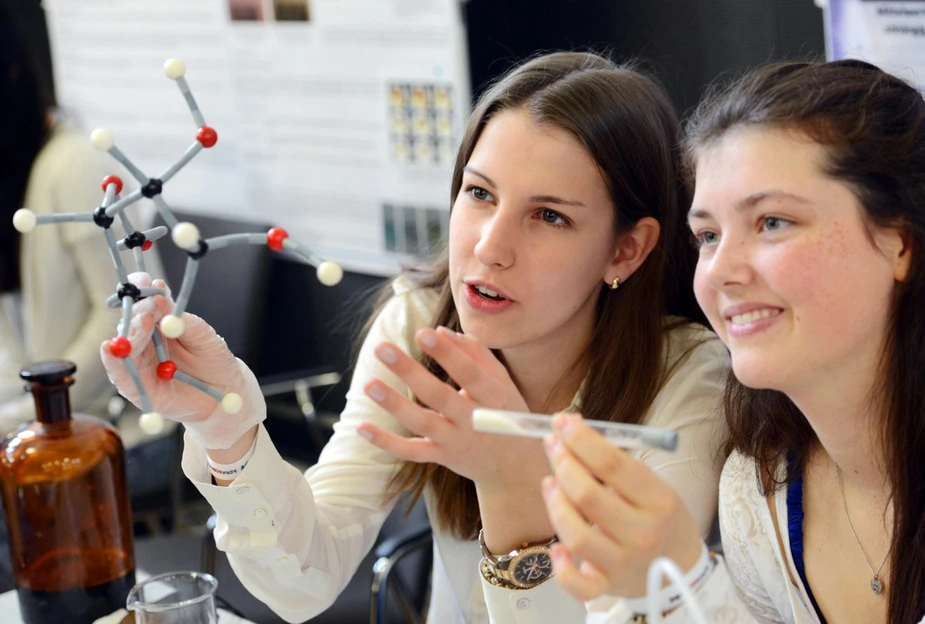Getting into High-Tech
An invitation to the STEM job fair in Adlershof
As a high-technology site, Adlershof depends on smart people. A trade fair on 4th July 2017 enables companies recruiting apprentices to meet high-school students from the region.
Apprenticeships and high-tech – how does that go together? Most often, when young people think of apprenticeships, they think of the world of skilled crafts with its wrenches, planes and scissors. A world that has no place for lasers, microsystems and genome analysis.
High-tech companies and research institutes offer diverse entry-level opportunities and apprenticeships for applicants of all genders. Many prospective applicants, however, are unaware that jobs like micro technician, precision optician and materials tester even exist. “Many students have either never heard of these jobs aren’t confident enough to apply,” explains Uta Voigt. She is well aware of these inhibitions because she has been working for ANH Berlin, the Ferdinand Braun Institute’s training network for high-technology, to educate students for many years.
On July 4th, many companies from Adlershof will showcase themselves to students from the Berlin-Brandenburg region. High-school level teenagers will swarm the area, where they may visit up to two companies each, learn about vacant apprenticeship positions and talk to prospective employers and their former apprentices to learn more about jobs and their future prospects.
“The dual apprenticeships are aimed at high-school students, who are strong in the STEM fields: science, technology, engineering, mathematics,” says Voigt. The requirement is a good intermediate-level school-leaving qualification or an Abitur, the university-entrance qualification in Germany. The fair also attracts many college dropouts, who often leave university to take up an apprenticeship due to its focus on application. Even after an apprenticeship, it is often possible to continue down the academic path later. Some universities, including the University of Applied Sciences Berlin, accept the credits earned in dual apprenticeships for their bachelor-level degrees.
It is important to inform high-school early on allowing them to be more flexible in planning their career – and be more open towards a job that focuses on application. Many high-tech companies of Adlershof and the surrounding regions offer abundant opportunities. The Optics Cluster Berlin Brandenburg network alone comprises 500 firms and institutes that are active in photonics and microsystems technology, pharmacy and chemistry. They depend on highly-skilled workers. “This is why it’s important to reach students before they graduate to give them the information they need about innovative apprenticeships and promising career paths,” says Voigt.
In July, Forum Adlershof e.V. will host a so-called career tour in cooperation with ANH Berlin and the “Lernfabrik NEUE TECHNOLOGIEN Berlin”. The latter two organisers are funded by the “Jobstarter plus” programme set up by the Federal Ministry for Education and the European Social Fund – and are pooling their strengths in an alliance for apprenticeships in Adlershof. Voigt hopes that many local companies will realise the importance of good job market information and join in. Moreover, she is confident that many interested students will come to catch a glimpse behind the scenes.
“We are committed to better connecting the region’s schools and companies beyond the project’s initial funding phase,” she says. The aim is to sustainably improve the apprenticeship landscape. With every new year entering the job market, their success depends on inspiring as many young people as possible, who are enthusiastic about STEM fields, to think about entering the high-tech job market.
However, distributing glossy brochures and searching job databases alone will not be enough to spark enthusiasm. “It has to be lively,” says Voigt. The Adlershof-based network is putting many things in motion: opportunities to visit workshops at the student laboratory “MicroLAB”, designing components and printing them on the Learning Factory’s 3D printer, interviewing scientists and other apprentices in laboratories and workshops or debating with others at the Girl’s Technology Conference. “We are inviting all our local companies to make best use of the things we are offering,” says Voigt.
By Peter Trechow for Adlershof Journal
